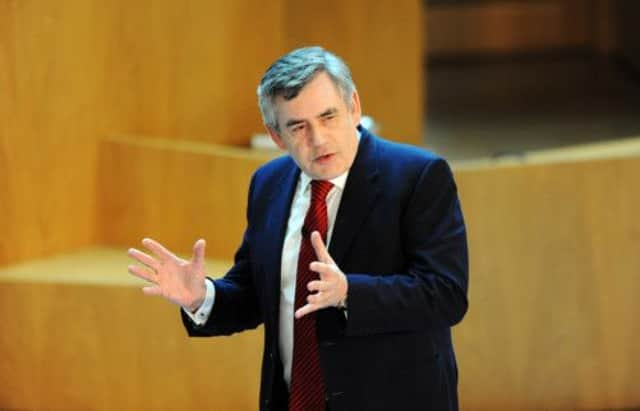Leaders: Brown is back, but the banter’s no better | Hats off to Hadfield of the ISS


Indeed, Mr Brown’s non-appearance in the House of Commons has become something of an embarrassment to his own party. However, the former prime minister has definitely returned to the political joust with a withering attack on the SNP’s plans for independence.
Speaking in Glasgow at the launch of the party’s Unite with Labour referendum campaign, Mr Brown came across as more forceful and politically focussed than he has done since he was in office. Something of the old fire seemed to return to the man who effectively modernised Labour – as in made them electable – in both Scotland and the UK. But Mr Brown has always been a staunch Unionist, even while leading the fight inside Labour (along with his mentor, the late John Smith) for devolution and an elected Scottish parliament with legislative powers.
Advertisement
Hide AdAdvertisement
Hide AdYet what was missing in Mr Brown’s anti-SNP broadside yesterday was substance. On taxes, he waxed populist rather than serious. He claimed that if an independent Scotland cut the rate of corporation tax to the same low level as Ireland, the Scottish Exchequer would lose £1.5 billion in revenues “immediately”. But, as a former Chancellor, Mr Brown knows that is not how it works. As demonstrated by the recent (successful) Swedish experience, a government does not have to slash tax rates instantly. Instead, it can pre-announce future cuts in tax to encourage investment and so stimulate growth (and receipts) in time to match the eventual tax reductions.
That said, the SNP’s Nicola Sturgeon was no more enlightening when responding yesterday to what Mr Brown had to say. She flatly maintained that taxes would not have to rise in an independent Scotland to pay for the SNP’s welfare proposals which would, we are assured, be fairer and more socially democratic. She justified this hostage to fortune by saying that in recent times Scots have contributed more tax per head than the UK average – assuming, of course, you take North Sea oil into account.
The point, however, is that economic growth has flat-lined since 2008 – in Scotland as much as in the UK – while the SNP’s welfare promises have mushroomed. That does not compute unless the SNP can boost growth to well beyond the 1.5 per cent Scotland has averaged for the past 30 years. Just how the SNP intends to achieve that remains obscure.
Perhaps, when Ms Sturgeon is finished promising more welfare entitlements, she might detail the microeconomic adjustments that will have to form the core of the SNP’s plans post independence.
The referendum campaign debate, even with Mr Brown’s return to the fray and Ms Sturgeon’s riposte, remains stuck like the proverbial gramophone needle. We are fed accusations and counter-accusations, many at the level of playground banter. Scotland deserves better.
Hats off to Hadfield of the ISS
Scotty, the legendary Scottish engineer of the Star Ship Enterprise, is only a fictional character. Regrettably, there has never been a Scot in space. But Chris Hadfield, Canadian-born commander of the International Space Station (ISS), might serve as something to be going on with.
Commander Hadfield has acquired a global following with his Facebook postings and tweets about life in space – including pictures of Scotland taken from the orbiting space station. In fact, the good commander is probably the most famous individual astronaut since Yuri Gagarin and Neil Armstrong.
Meanwhile, back on planet Earth, there are those churlish enough to dismiss Cmdr Hadfield’s megastardom as a Nasa stunt to justify the £65 billion it cost to build and operate the ISS. And it is true that the scientific job done by the station might have been achieved in more cost-effective ways by the private sector. But that misses the point.
Advertisement
Hide AdAdvertisement
Hide AdCmdr Hadfield has almost single-handedly revived some of the old popular magic associated with space flight 50 years ago. In a world mired in economic crisis, failed states, and a loss of optimism, Cmdr Hadfield has made us remember the lesson of the famous picture of our blue planet taken from lunar orbit by Apollo 8 back in 1968: that we are all citizens of one Earth, the only habitat we possess in a cold, dark universe. Earth is not only magnificently beautiful – it is the only planet we’ve got. So we need to learn to live with each other and make the best of our bit of planetary real estate.
Cmdr Hadfield is due back on the ground today. We should give him a big welcome for having reminded us of some home truths.